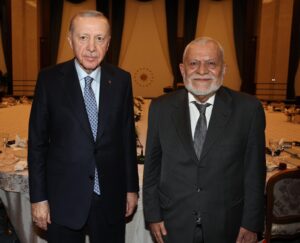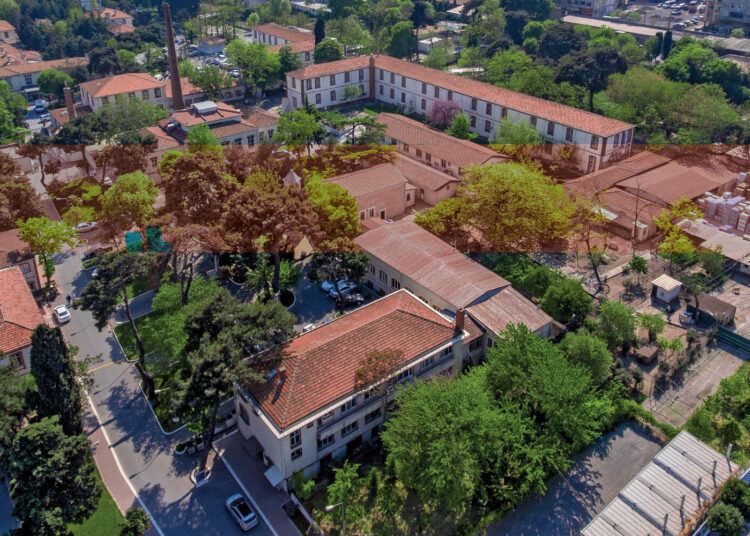Abdullah Bozkurt / Stockholm
A decades-long denial of democratic elections at Istanbul’s wealthiest minority foundation has attracted renewed international scrutiny as Turkish authorities continue to defy a Constitutional Court ruling that found the practice to be a violation of basic rights.
Founded in 1794 and recognized under the 1923 Treaty of Lausanne as a minority community foundation, the Balıklı Greek Hospital Foundation (Balıklı Rum Hastanesi Vakfı, BRHV) oversees a vast network of charitable services, including a hospital, elderly care homes and clinics. It also has extensive real estate assets, making it the wealthiest institution of its kind in Turkey’s dwindling Greek Orthodox community.
Yet the foundation has been unable to hold a board election since 1991, when the current board was formed amid widespread irregularities that effectively excluded the broader Greek community from participation. The board has faced serious criticism from community members over alleged irregularities and a lack of transparency.
The board’s chairman, Konstantin Yuvanidis, is reportedly close to Turkish President Recep Tayyip Edogan. In an interview with Sabah, a newspaper owned by Erdogan’s family, in October 2023, Yuvanidis praised the president, saying, “Thanks to our president minorities are experiencing a golden age. We used to be second-class citizens. Now, we feel like equal citizens. Since the time of Atatürk, no government has approached minorities in this way — all of them took things from minorities without giving anything in return. With Edogan, minorities have regained both their properties and their rights,” and adding, “To deny this is ingratitude. We are living in the freest period of our lives.”
The primary reason for the absence of elections lies in a legal and bureaucratic limbo created by Turkish authorities. The current board has also avoided initiating an election, stating they will not proceed without a green light from the government.

According to 2004 and 2008 regulations published in Turkey’s Official Gazette, minority foundations are required to hold board elections every four years. While other minority communities complied with these rules, BRHV repeatedly failed to do so. Community members report that their appeals to the General Directorate of Foundations (Vakıflar Genel Müdürlüğü, VGM), the authority overseeing foundations in Turkey, and to the board itself have gone unanswered.
A legal vacuum emerged following the 2013 annulment of previous election regulations. Although the government pledged to introduce a new framework, no replacement was issued for nearly a decade. In the meantime BRHV’s administration remained unchanged, effectively denying Greek Orthodox members any say in the governance of their community’s most important institution.
In 2014 BRHV members filed a lawsuit in a Turkish court, arguing that the absence of elections violated both the Turkish Constitution and the European Convention on Human Rights. The Bakırköy 7th Civil Court dismissed the case, ruling that the lack of a regulatory framework was not a judicial matter. The court disregarded an expert report that deemed the current board unlawful and stated that elections could still be held based on existing regulations.
A Turkish Constitutional Court ruling found that the Turkish government violated the fundamental rights of the Greek minority community by failing to facilitate board elections at the Balıklı Greek Hospital Foundation:
Appeals to the Supreme Court of Appeals (Yargıtay) were rejected in November 2017, prompting an individual application to Turkey’s Constitutional Court in 2019. Plaintiffs Efthymia Meentzlou, Evdoksia Galanopulo, Katina Evdokiya Veriopolos, Maria Filimon and Keti Vuças claimed they were unable to oversee the foundation and alleged violations of their rights to property, freedom of religion and conscience and freedom of association.
In a decision issued on December 19, 2023, the Constitutional Court ruled that the prolonged suspension of elections violated the applicants’ freedom of association under Article 33 of the constitution and Article 11 of the European Convention on Human Rights. The court ordered the General Directorate of Foundations to take immediate steps to organize elections at BRHV. However, no elections have been held to date.
On July 2, 2024, the applicants submitted a petition to the VGM requesting compliance with the court’s decision. The VGM responded on July 24, stating that foundations administering hospitals required a special regulation approved by the Ministry of Health. This requirement, based on Article 15 of a 2022 regulation, mandated that elections be held by December 31, 2023 — a deadline that passed without action.
The Ecumenical Federation of Constantinopolitans submitted a letter to the United Nations protesting the Turkish authorities’ obstruction of board elections at the Greek minority community’s foundation:
Legal experts argue that the VGM’s reliance on Ministry of Health approval lacks a basis in Turkish law, the Foundations Law or the Treaty of Lausanne. A group of community members has filed a separate lawsuit with the Council of State, challenging the legality of the 2022 regulation.
Amid growing frustration, community leaders have brought their case to the United Nations. A letter submitted on April 24, 2025, by the Ecumenical Federation of Constantinopolitans cites Articles 40 and 42 of the Lausanne Treaty, asserting that Turkey is in systemic violation of its international obligations to safeguard minority rights. The letter underscores that BRHV, the largest of Turkey’s 70 Greek Orthodox foundations, has operated without community oversight for more than three decades.
Today, the Greek Orthodox population in Turkey numbers fewer than 1,000 — down from over 125,000 a century ago. For many the BRHV case symbolizes not only a failure of legal and administrative justice but also the continued erosion of institutional autonomy for non-Muslim minorities.
Despite the Constitutional Court’s ruling, no clear indication has emerged regarding when — or if — the required electoral regulation for minority foundations that administer hospitals will be issued.












